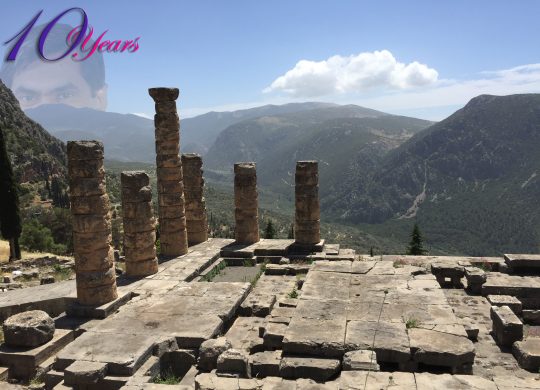Oracle!

I was in Greece last month, and got to visit the remains of the ancient Temple at Delphi, now recognized by UNESCO as a World Heritage Site. Delphi (DEL-FEE in Greek) is located on the slopes of Mount Parnassus, supposedly sacred to the gods Dionysius and Apollo, and home to the Muses.
The site of the Temple was said to have been determined by Zeus, who located the edifice at the center of the earth (which, as Gaia, was Zeus’s grandmother). There the “navel” of the earth was found, and there the Temple was built, in the classical period of Greece, ca. 600 BC.
The Pythian (apparently there was a python who guarded the “navel,” which was slain by Apollo) Games were held here once every four years, as well as musical performances and competitions.
But the Temple at Delphi was primarily known for its oracle—the Oracle of Pythia in the form of priestesses ministering in the sanctuary. Apollo, seemingly, spoke to one of these women sitting on a tripod over a fissure in the earth. Fumes emanating from this chasm would, it is thought, intoxicate and entrance the priestess and, possessed by Apollo, she would prophesy in ecstatic utterances.
Of course, these cryptic oracles needed to be explained. So, on hand, were a bunch of priests who would translate the oracular utterances into poetry. Said Strabo, the Greek philosopher and historian, in the first century AD:
Over the mouth [of the fissure] a high tripod is set. Mounting this, the Pythia inhales the pneuma and then speaks prophecies in verse or in prose. The latter are versified by poets on duty in the temple.”
The Delphic Oracle was pretty influential throughout the Greek world and was consulted before every major undertaking: wars, colonial expansions, economic initiatives, etc. Even the Romans were respectful of Delphi: the emperor, Hadrian, in the second century AD visited the site at least twice.
So, here in male-dominated classical Greece, the most influential voice belonged to a woman, the Delphic oracle!
At any rate, by the fourth century AD, Delphi declined, partly due to the rise of Christianity. In fact, Constantine the Great looted several monuments from the Temple to decorate his new capital, Constantinople (some of which are still visible in Istanbul).
Once, King Croesus (fifth century BC) inquired of the oracle whether he should fight the Persians.
The Oracle replied:
After crossing the Halys [a river in Anatolia], Croesus will destroy a great empire.”
He did. His own. Croesus was defeated by the Persian king, Cyrus.
So much for the oracle.
But not so the voice of God.
Every word of God is pure …
Proverbs 30:5
Forever, Yahweh, is Your word; it is established in heaven.
Psalm 119:89
And therefore, Scripture alone, is inspired and profitable for our faith and practice.
All Scripture is inspired by God and profitable for teaching,
for reproof, for correction, for training in righteousness;
so that the child of God may be adequate, equipped for every good work.
2 Timothy 3:16–17
For whatever was written in former times was written for our instruction,
so that through endurance and through the encouragement of the Scriptures we might have hope.
Romans 15:4
Declared the Church Father, Athanasius of Alexandria, in the fourth century AD:
They who thirst may be satisfied with the living words they [the Scriptures] contain. In these alone is proclaimed the doctrine of godliness. Let no man add to these, neither let him take aught from these.”
And so we are to …
Preach the word!
2 Timothy 4:2












 Abe Kuruvilla is the Carl E. Bates Professor of Christian Preaching at The Southern Baptist Theological Seminary (Louisville, KY), and a dermatologist in private practice. His passion is to explore, explain, and exemplify preaching.
Abe Kuruvilla is the Carl E. Bates Professor of Christian Preaching at The Southern Baptist Theological Seminary (Louisville, KY), and a dermatologist in private practice. His passion is to explore, explain, and exemplify preaching.